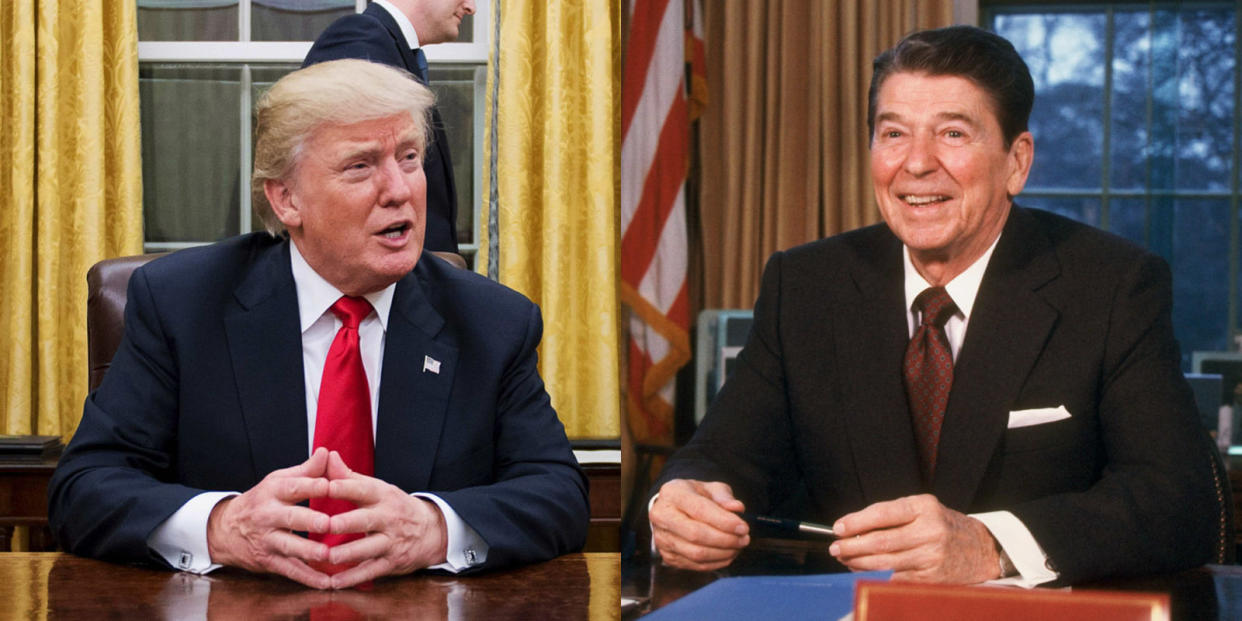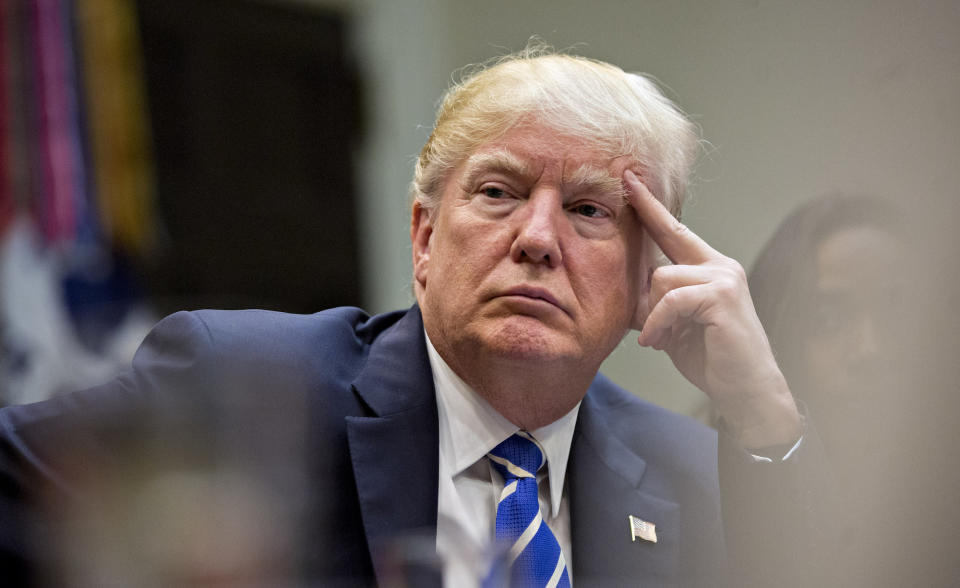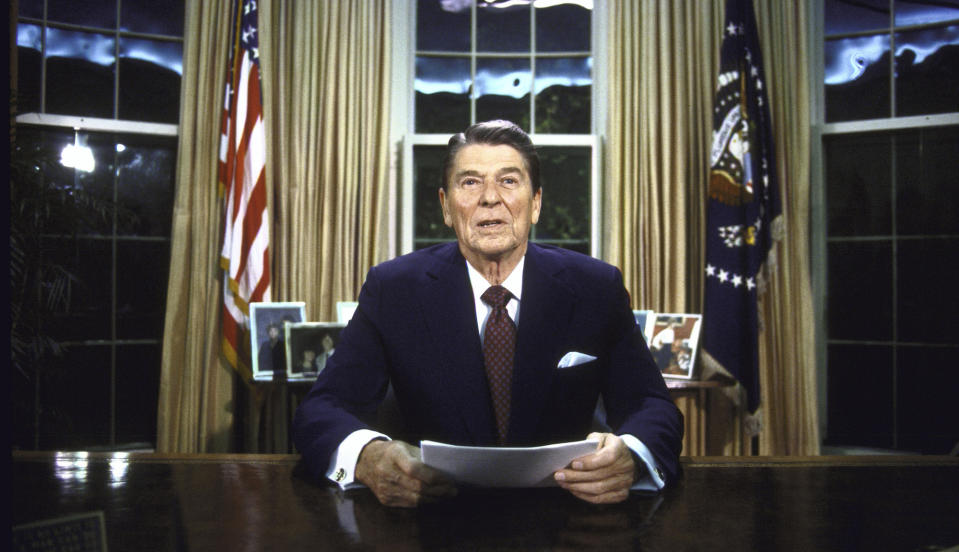The 100 Days: Who Can Stop an Unfit President*?

The First 100 Days, a Temporary Series-Day 95: The Incoherent Presidency
The word for the 95th day of the presidency* of Donald Trump is "unintelligible." As nearly as I can recall, the word first came to political prominence on April 29, 1974, when President Richard M. Nixon, in one of his last desperate attempts to throw the hounds of Watergate off his tracks, released to the nation edited transcripts of carefully selected White House tape recordings. (The president* will celebrate his 100th day in office with a rally in Pennsylvania on Saturday, the 43rd anniversary of the release of these transcripts. History rhymes.) More famously, the transcripts injected the phrase, "Expletive deleted" into the political jargon.
But "unintelligible" had its day, too. Given what they already knew about Nixon, many people around the country suspected that what was "unintelligible" probably had something to do with a crime or two. Over the weekend, "unintelligible" came back into our politics in a new and terrifying way.
The Associated Press sat down with the president* for an extended one-on-one interview. Now, presuming that Julie Pace, the reporter conducting the interview, wasn't over in Lafayette Park, shouting questions through the wrought-iron fences, and presuming that all recording devices, including the reporter's pad and pen, were working properly, what do we make of the fact that, on more than 20 occasions, the president*'s response was said to be "unintelligible." For example:
TRUMP: Now, if I can do that (unintelligible) ... As an example, the aircraft carriers, billions of dollars, the Gerald Ford, billions and billions over budget. That won't happen.
AP: Is that something you're going to take on?
TRUMP: (unintelligible) But as we order the other ones, because they want to order 12, the other ones are going to come in much less expensive. ...
How can something said in this interview situation possibly be "unintelligible"? Did the president* mumble something into his shirt? Did he lapse into whispering? Did he start speaking in Aramaic or in tongues? Did he start singing obscure show tunes in an unknown Balkan dialect? What in the name of god is going on here?
"Unintelligible" had its day.
The answers that were not marked "unintelligible" were not very intelligible themselves. (And I don't even count the moment in which the president* stopped a conversation about China and North Korea to offer the reporter a soft drink. That was indeed weird, but arguably thoughtful.) There was the customary boasting. Here he is, bragging about how he, personally, knuckled a defense contractor.
TRUMP: I saved $725 million on the 90 planes. Just 90. Now there are 3,000 planes that are going to be ordered. On 90 planes I saved $725 million. It's actually a little bit more than that, but it's $725 million. Gen. Mattis, who had to sign the deal when it came to his office, said, "I've never seen anything like this in my life." We went from a company that wanted more money for the planes to a company that cut. And the reason they cut - same planes, same everything - was because of me. I mean, because that's what I do.
There is the customary lack of a through-line in everything he says.
AP: You did put out though, as a candidate, you put out a 100-day plan. Do you feel like you should be held accountable to that plan?
TRUMP: Somebody, yeah, somebody put out the concept of a hundred-day plan. But yeah. Well, I'm mostly there on most items. Go over the items, and I'll talk to you ...
(Crosstalk.)
TRUMP: But things change. There has to be flexibility. Let me give you an example. President Xi, we have a, like, a really great relationship. For me to call him a currency manipulator and then say, "By the way, I'd like you to solve the North Korean problem," doesn't work. So you have to have a certain flexibility, Number One. Number Two, from the time I took office till now, you know, it's a very exact thing. It's not like generalities.
And then he offered her a Coke. Honest.
There was the customary sprawling ravine between his applause lines on the stump and what he's actually doing, delivered in what appears at first glance to be English but which, on further review, seems to be a dialect somewhere between Old English and Woody Woodpecker.
TRUMP: But President Xi, from the time I took office, he has not, they have not been currency manipulators. Because there's a certain respect because he knew I would do something or whatever. But more importantly than him not being a currency manipulator the bigger picture, bigger than even currency manipulation, if he's helping us with North Korea, with nuclear and all of the things that go along with it, who would call, what am I going to do, say, "By the way, would you help us with North Korea? And also, you're a currency manipulator." It doesn't work that way…And the media, some of them get it, in all fairness. But you know some of them either don't get it, in which case they're very stupid people, or they just don't want to say it. You know because of a couple of them said, "He didn't call them a currency manipulator." Well, for two reasons. Number One, he's not, since my time. You know, very specific formula. You would think it's like generalities, it's not. They have - they've actually - their currency's gone up. So it's a very, very specific formula. And I said, "How badly have they been," ... they said, "Since you got to office they have not manipulated their currency." That's Number One, but much more important, they are working with us on North Korea. Now maybe that'll work out or maybe it won't. Can you imagine? ...
Seriously, a quick "unintelligible" would have covered this answer and saved space.
And then it all comes together as he explains coming to the realization that being president is a very important gig.
AP: Can I ask you, over your first 100 days - you're not quite there yet - how do you feel like the office has changed you?
TRUMP: Well the one thing I would say - and I say this to people - I never realized how big it was. Everything's so (unintelligible) like, you know the orders are so massive. I was talking to -
AP: You mean the responsibility of it, or do you mean -
TRUMP: Number One, there's great responsibility. When it came time to, as an example, send out the 59 missiles, the Tomahawks in Syria. I'm saying to myself, "You know, this is more than just like, 79 (sic) missiles. This is death that's involved," because people could have been killed. This is risk that's involved, because if the missile goes off and goes in a city or goes in a civilian area - you know, the boats were hundreds of miles away - and if this missile goes off and lands in the middle of a town or a hamlet .... every decision is much harder than you'd normally make. (unintelligible) ... This is involving death and life and so many things. ... So it's far more responsibility. (unintelligible) ....The financial cost of everything is so massive, every agency. This is thousands of times bigger, the United States, than the biggest company in the world. The second-largest company in the world is the Defense Department. The third-largest company in the world is Social Security. The fourth-largest - you know, you go down the list…It's massive. And every agency is, like, bigger than any company. So you know, I really just see the bigness of it all, but also the responsibility. And the human responsibility. You know, the human life that's involved in some of the decisions.
Everything is such a mystery.
The biglyness of it all.
Death, and life, and so many things.
The boats were far away from where the missiles landed.
The Department of Defense and the Social Security Administration are "companies."

I don't even want to guess at what was "unintelligible" in this remarkable passage. I prefer to be amazed that we're all not dead yet. But don't be concerned. The president* gave a speech to Congress once and didn't attempt to eat the podium so it's all good.
(An aide talks about the president's address to Congress.)
TRUMP: A lot of the people have said that, some people said it was the single best speech ever made in that chamber.
Some people say this.
Back in 1984, when he was running for re-election, Ronald Reagan took the stage for a debate with Walter Mondale, and Reagan clearly didn't know where he was or much of what was going on around him. Had he been asked what city he was in, the president would have been stuck for an answer. To a great number of clinical neurologists around the country, what they saw that night looked like what they saw in their examining rooms every day. The president was cognitively impaired, and seriously so.
(What we didn't know at the time, and found out only later, thanks in part to Jane Mayer and Doyle McManus and their book, Landslide, was that people in and around the Reagan administration thought so, too. A veteran operative named James Cannon even was tasked by Reagan's then chief-of-staff, Howard Baker, to research the provisions for relieving a president under the 25th Amendment.)

A decade earlier, with the pressures of the Watergate matter intensifying to intolerable levels, and with President Nixon stalking the halls of the White House, half-drunk and seething with impotent rage, the White House staff covertly removed the president's national command authority from him. This was blatantly unconstitutional and handed that authority over to people like Alexander Haig and Henry Kissinger. But it happened nonetheless.
In their book, Mayer and McManus discuss at length the conclusions Cannon reached during his research of the presidential removal procedures, and the interviews he did with staffers in the Reagan White House. They write:
More chilling than anything else was the portrait these aides drew of the president they served. They spoke with Cannon in confidence; one by one, he recalled, "They told stories about how inattentive and inept the president was. He was lazy; he wasn't interested in the job…all he wanted to do was to watch movies and television in the residence. They felt free to sign his initials on documents without noting that they were acting for him. When I asked a group of them who among them thought they had the authority to sign in the president's name, there was a long, uncomfortable silence. Then one answered, 'Well, everybody, and nobody.'"
When Cannon did his research and delivered his report, President Ronald Reagan was 73, three years older than the president* who said this to the Associated Press…
TRUMP: In fact, they also did. I never thought I had the ability to not watch. Like, people think I watch (MSNBC's) "Morning Joe." I don't watch "Morning Joe." I never thought I had the ability to, and who used to treat me great by the way, when I played the game. I never thought I had the ability to not watch what is unpleasant, if it's about me. Or pleasant. But when I see it's such false reporting and such bad reporting and false reporting that I've developed an ability that I never thought I had. I don't watch things that are unpleasant. I just don't watch them.
…right after saying this…
TRUMP: No I have, it's interesting, I have, seem to get very high ratings. I definitely. You know Chris Wallace had 9.2 million people, it's the highest in the history of the show. I have all the ratings for all those morning shows. When I go, they go double, triple. Chris Wallace, look back during the Army-Navy football game, I did his show that morning.
AP: I remember, right.
TRUMP: It had 9.2 million people. It's the highest they've ever had. On any, on air, (CBS "Face the Nation" host John) Dickerson had 5.2 million people. It's the highest for "Face the Nation" or as I call it, "Deface the Nation." It's the highest for "Deface the Nation" since the World Trade Center. Since the World Trade Center came down. It's a tremendous advantage.
I have learned one thing, because I get treated very unfairly, that's what I call it, the fake media. And the fake media is not all of the media. You know they tried to say that the fake media was all the, no. The fake media is some of you. I could tell you who it is, 100 percent. Sometimes you're fake, but - but the fake media is some of the media. It bears no relationship to the truth. It's not that Fox treats me well, it's that Fox is the most accurate.
There is a serious problem here and, from my seat, there's no Howard Baker in this administration to send out a Jim Cannon to find out if the president's incoherent domestic policy, and his incoherent foreign policy, and his incoherence in thought and speech, are all related to each other in deeply perilous ways. Like anything else, the American republic can watch its luck run out.
Respond to this post on the Esquire Politics Facebook page.
You Might Also Like

 Yahoo News
Yahoo News 
